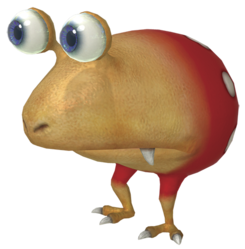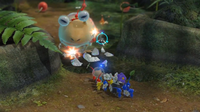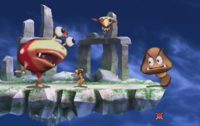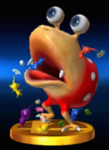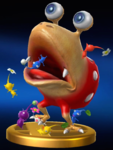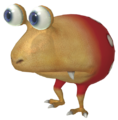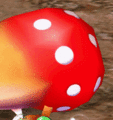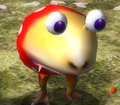Bulborb: Difference between revisions
| Line 216: | Line 216: | ||
|JapR = Aka Chappī | |JapR = Aka Chappī | ||
|JapM = Red Chappy | |JapM = Red Chappy | ||
|Ger = Roter Punktkäfer | |Ger = Roter Punktkäfer (''Pikmin 2'')<br>Punktkäfer (''Pikmin 3'') | ||
|GerM = Red Dot Beetle | |GerM = Red Dot Beetle | ||
|PorP = Olborbo | |PorP = Olborbo | ||
Revision as of 07:25, June 19, 2016
| |||
|---|---|---|---|
| Appears in | Pikmin, Pikmin 2, Pikmin 3 | ||
| Scientific name | Oculus kageyamii russus | ||
| Family | Grub-dog | ||
| Areas | The Forest of Hope, Valley of Repose, Awakening Wood, Garden of Hope, Tropical Wilds, Formidable Oak | ||
| Caves | Hole of Beasts, Hole of Heroes, Dream Den | ||
| Challenge Mode stages | The Forest of Hope, The Distant Spring, Explorer's Cave, Lost Toy Box, Red Chasm, Collector's Room, Breeding Ground, Emperor's Realm | ||
| Mission Mode Collect Treasure! stages | Tropical Forest, Twilight Hollow, Shaded Garden, Tropical Forest Remix, Twilight Hollow Remix, Beastly Caverns | ||
| Mission Mode Battle Enemies! stages | Tropical Forest, Silver Lake, Thirsty Desert, Shaded Garden, Garden of Hope Remix, Formidable Oak Remix | ||
| Side Story days | None | ||
| 2-Player Battle stages | Angle Maze | ||
| Bingo Battle stages | Shaded Terrace, Stagnant Sea, Jigsaw Colosseum | ||
| Attacks | Eats Pikmin | ||
Red Bulborbs (アカチャッピー?, lit.: "Red Chappy") are among the most well-known enemies in the Pikmin games and are often just as much a staple for the games as Pikmin themselves. They were originally known as Spotty Bulborbs until various other subspecies, all with spots, were discovered in Pikmin 2. In Pikmin 3, it is simply named Bulborb, despite the Orange Bulborb also appearing in the game. This nocturnal creature will sleep out in the open, exposing itself to Pikmin attacks.
Bulborbs in general are surprisingly apathetic creatures and won't arise from their sleep even if one of their own is under attack. That being said, however, Dwarf Bulborbs in Pikmin will let out a screech when agitated, awaking any nearby Bulborbs.
Stats
| Game | Weight | Max. carriers |
Seeds | Value | Health | Regen. |
|---|---|---|---|---|---|---|
| 10 | 20 | 12 | N/A | 1100 | Unknown | |
| 10 | 20 | 12 | 750 | No | ||
| 10 | 20 (normally) | 10 | 1000 | No |
Notes
Olimar's voyage log
Reel notes
Olimar's notes
Louie's notes
Pikmin 3 Nintendo Player's Guide
“The weakest of the larger Bulborbs, the Red Bulborb can still hold its own against a good-sized Pikmin squad. Since it is a nocturnal species, most of the Red Bulborbs that you encounter in the daytime will be asleep to start. Sneak up on them from behind and hit them with a stream of flying Pikmin.”
Pikmin 3 website
“It's considered one of the weakest of the Bulborbs, but can still hold its own against a good-sized Pikmin squad. Attack from behind to gain the advantage. Weakest point: eyeballs.”
Pikmin 3 Prima Guide
“These large creatures use their jaws to gobble up several Pikmin with each bite. Whenever possible, use a large squad of Pikmin to charge the creature from the rear. If brute force isn’t an option, throw Red Pikmin and Rock Pikmin onto the creature’s back. During an extended battle, it’s important to retrieve your Pikmin as the Bulborb shakes them off.”
Biology
Red Bulborbs are among the most mammalian enemies in the series due to them having leathery, soft skin and bulbous eyes, opposed to the compound eyes of most insects. Judging by the size of their eyes and their nocturnal lifestyle, their eyes have a wide pupil, a large lens and possible increased retinal surface used for collecting more ambient light during night time.
Olimar mentions the Red Bulborbs having a set of mandibles. Mandibles are a pair of appendages near an insects mouth, used for grinding and chewing food. The so-called mandibles Olimar mentions in his notes look nothing like normal mandibles and are instead most likely sabre-teeth, used for breaking exoskeletons of prey insects and digging through the soil for roots. Their diet is, however, quite the mystery, as they are equipped with eating both animal and vegetable life, but they are known to fully ignore Spectralids.
It seems that the juvenile Red Bulborb is the favored host of the parasitic Pikmin known as Bulbmin. This type of Pikmin appears to control its host, causing the animal to behave less like a Bulborb and much more like a Pikmin, following a leader (which is naturally an older Bulbmin) and hunting in packs. Red Bulborbs are not observed at the two stages of development displayed by Bulbmin anywhere else in-game (unlike the Spotty Bulbear), so it is unknown whether Bulbmin are a common stage in Red Bulborb initial development or not, as symbiotic cooperation from the parasite would give this slightly weaker form of Grub-dog an advantage in the subterranean environment that all stages of the Red Bulborb species are found in.
Strategy
|
The following article or section contains guides. |
Pikmin
Swarming it with a large group of 50 or so Pikmin, preferably Reds due to their high attack power, proves quite effective. If only a few Pikmin are available, they should be thrown onto the Bulborb's back repeatedly while retreating if the enemy starts charging at them. Waiting until it goes back to sleep takes longer, but is a lot safer. If bomb-rocks are used, the Bulborb will die with two blasts. If you attack its back it will usually do a quarter-turn right, hiding some of its back from your current position.
Pikmin 2
Rather than swarming it, continuously tossing Pikmin onto its back is preferable when the army is at least 30 Pikmin strong, even if some are shaken off. A few Purple Pikmin can cause serious damage, especially if they stun the Bulborb. If it is accidentally awakened before being attacked by Pikmin, you should run away until it turns around, then make a new pass at it.
If the Pikmin army is very small, the creature can also be woken up and made to chase the leader until it leaves its territory, at which point it will turn around and return to its original sleeping spot. At this point the player must follow it and wait for it to reach its spot. Once there it will yawn, fall asleep, then wake up and attack again if provoked. Beginning the attack at the moment the creature yawns provides the player with a few crucial seconds in which the Bulborb is entirely immobilized and harmless.
In some metallic themed caves, Red Bulborbs can be led off of the stage by awakening it and quickly running around a hole in the sublevel, causing it to fall off.
Pikmin 3
The first game's tactic of swarming the creature from behind returns in this game, though here it is far more effective. If the Pikmin charge at the creature's behind, they will flawlessly cling to it as it rises and continue attacking, making 20 Red Pikmin enough to take it down before it has any chance of resistance.
If it is awake, repeatedly throw Pikmin at its eyes, even when it's shaking in pain, and whistle them when they scatter around and you end up low on Pikmin to throw. You can also escape from a Red Bulborb by hiding under a tall plant.
In the Super Smash Bros. series
|
This article or section is a short summary on the enemy in the Super Smash Bros. series. |
A Red Bulborb is the main stage hazard on the Distant Planet stage in Brawl and Super Smash Bros. for 3DS. It is considerably larger than a Bulborb in the Pikmin series, and will periodically appear on the right side of the stage. It occasionally opens its mouth, and any fighters that fall in will be eaten and taken away, resulting in a KO.
In the Smash Run mode of Super Smash Bros. for 3DS, a Red Bulborb appears as one of many enemies featured in the mode. It is one of the largest enemies in the game, and has a comparable amount of knockback resistance. Its attacks are also deadly, KOing fighters with minimal effort.
A Red Bulborb also appears in the background of the Garden of Hope stage in Super Smash Bros. for Wii U, but its purpose is merely cosmetic. Finally, there is a sticker for a Red Bulborb in Super Smash Bros. Brawl, but it is merely called "Bulborb".
Brawl trophy
| File:BulborbTrophy.jpg | Description:
“A creature whose Japanese name translates as "spotted crimson bug-eye." These bulky nocturnal animals have white-and-red-flecked rumps that resemble strawberries. Red bulborbs sleep in the day and wake in the evening to feed on small animals. Several colors of bulborb subspecies have been discovered—their classification is a hot subject for scholars. | |
| How to obtain: Random appearance. | Type: Stage | |
Smash 4 trophy
- 3DS
- Wii U
Technical information
| Pikmin technical information (?) | |||
|---|---|---|---|
| Internal name | swallow
| ||
| HP | 1100 | ||
| Pikmin 2 technical information (?) | |||
|---|---|---|---|
| Internal name | chappy
| ||
| Global properties (List) | |||
| ID | Japanese comment | Property | Value |
| s000 | friction(not used) | Friction | 0.5 |
| s001 | wallReflection | Unknown (wall bounce speed multiplier?) | 0.5 |
| s002 | faceDirAdjust | Unknown | 0.25 |
| s003 | accel | Acceleration | 0.1 |
| s004 | bounceFactor | Unknown (bounce when it hits the ground?) | 0.3 |
| fp00 | ライフ | HP | 750 |
| fp01 | マップとの当り | Unknown (related to slopes) | 40 |
| fp02 | ダメージスケールXZ | Horizontal damage scale | 0.3 |
| fp03 | ダメージスケールY | Vertical damage scale | 0.3 |
| fp04 | ダメージフレーム | Damage scale duration | 0.35 |
| fp05 | 質量 | Unknown (weight?) | 0.1 |
| fp06 | 速度 | Move speed | 100 |
| fp08 | 回転速度率 | Rotation acceleration | 0.4 |
| fp09 | テリトリー | Territory radius | 400 |
| fp10 | ホーム範囲 | "Home" radius | 15 |
| fp11 | プライベート距離 | "Private" radius | 70 |
| fp12 | 視界距離 | Sight radius | 500 |
| fp13 | 視界角度 | FOV | 90 |
| fp14 | 探索距離 | Unknown (exploration radius?) | 500 |
| fp15 | 探索角度 | Unknown (exploration angle?) | 90 |
| fp16 | 振り払い率 | Successful shake rate | 1 |
| fp17 | 振り払い力 | Shake knockback | 120 |
| fp18 | 振り払いダメージ | Shake damage | 1 |
| fp19 | 振り払い範囲 | Shake range | 40 |
| fp20 | 攻撃可能範囲 | Unknown (shock attack max range?) | 75 |
| fp21 | 攻撃可能角度 | Unknown (shock attack max angle?) | 25 |
| fp22 | 攻撃ヒット範囲 | Unknown (attack hit range?) | 80 |
| fp23 | 攻撃ヒット角度 | Unknown (attack hit angle?) | 35 |
| fp24 | 攻撃力 | Attack damage | 10 |
| fp25 | 視界高 | Unknown (height visibility?) | 50 |
| fp26 | 探索高 | Unknown (exploration height?) | 50 |
| fp27 | ライフの高さ | HP wheel height | 90 |
| fp28 | 回転最大速度 | Rotation speed | 4 |
| fp29 | 警戒時間 | Unknown (warning time?) | 7 |
| fp30 | 警戒ライフ | Unknown | 30 |
| fp31 | ライフ回復率 | Regeneration rate | 0 |
| fp32 | LOD半径 | Off-camera radius | 40 |
| fp33 | マップとのあたりポリゴンの選定 | Collision processing radius | 50 |
| fp34 | ピクミンとのあたり | Pikmin damage radius | 30 |
| fp35 | 石化時間 | Petrification duration | 1 |
| fp36 | ヒップドロップダメージ | Purple Pikmin drop damage | 50 |
| fp37 | 地震気絶確立 | Purple Pikmin stun chance | 0.3 (30%) |
| fp38 | 地震気絶時間 | Purple Pikmin stun time | 5 |
| ip01 | 振り払い打撃A | Shake mode 1 – hit count | 6 |
| ip02 | 振り払い張付1 | Shake mode 1 – Pikmin requirement | 5 |
| ip03 | 振り払い打撃B | Shake mode 2 – hit count | 12 |
| ip04 | 振り払い張付2 | Shake mode 2 – Pikmin requirement | 10 |
| ip05 | 振り払い打撃C | Shake mode 3 – hit count | 17 |
| ip06 | 振り払い張付3 | Shake mode 3 – Pikmin requirement | 20 |
| ip07 | 振り払い打撃D | Shake mode 4 – hit count | 22 |
| Specific properties | |||
| ID | Japanese comment | Property | Value |
| fp01 | 足元範囲 | Unknown (foot range?) | 30 |
| fp02 | 白ピクミン毒 | White Pikmin poison damage | 750 |
| Pikmin 3 technical information (?) | |
|---|---|
| Internal name | chappy
|
| HP | 1000 |
| Rock Pikmin throw hits to kill | 25 |
| White Pikmin ingestions to kill | 5 |
| Bomb rock explosions to kill | 1 |
| Bomb rock ingestions to kill | 1 |
| Number of direct hits on top to kill | 0 |
| Damage to leaders | 20 |
| Territory radius | 300 |
| Mission Mode value | 50 |
Other information
- Technical name in The Official Nintendo Player's Guide: Greater Grub-Dog
- Size: Body length: 90mm, as per the e-card
- Pikmin 2 Piklopedia number: #1
Development history
Bulborbs were created before the concept for Pikmin was established. When Adam and Eve was being worked on, the Red Bulborb had been created to serve as a mammoth-like beast. When the concept for the game was scrapped, the Bulborbs were reused for Pikmin. As clued by the internal name for this enemy and the Dwarf Red Bulborb, it is possible that the Dwarf Red Bulborb is the original Bulborb, and the Red Bulborb was created afterwards in development, although the "mammoth" properties of the beast, as mentioned by Shigeru Miyamoto, indicate that the first "Bulborb" creature to be developed was large, and hence, not the Dwarf Red Bulborb.
Their name in Pikmin is "Spotty Bulborb", and at this point, only one type of Bulborb was planned to exist (besides the false variations of Bulborb, the Dwarf Bulborbs). For Pikmin 2, it was decided that further types of Bulborb would be developed, but because they would all be Bulborbs and have spots on their backs, the original one needed a rename. Due to it being red while the others are orange and hairy, the name "Red Bulborb" was given to this enemy.
In the New Play Control! remake of Pikmin, their sounds were changed to be much higher-pitched, although this is likely an oversight.
For Pikmin 3, perhaps with the purpose to simplify things, its name became known simply as "Bulborb", despite two other types of Bulborb existing in the game: the Orange Bulborb and the Whiptongue Bulborb. In an attempt to flesh out this iconic enemy, its behavior was made slightly more complex in this game, in the form of it reacting to Pikmin thrown at its eyes with a flinch, and by looking at Pikmin while it chases them. These behaviors also happen with the other Bulborbs.
Naming
The first word in the name "Red Bulborb" refers to its red coloration, in comparison with other known Bulborbs. The name "Bulborb" itself is likely a combination of "bulb" and "orb", referring to its large, round eyes and bulbous body. The term "Spotty Bulborb" was initially used to refer to this enemy, in Pikmin, until other types of Bulborbs were made for Pikmin 2. "Spotty Bulborb" is also used in New Play Control! Pikmin. The "Spotty" in the name is due to the spots it has on its back.
According to the Brawl trophy, its Japanese name, アカチャッピー? translates to "Spotted Crimson Bug-eye". The Japanese name in Pikmin is merely チャッピー?, lit.: "Chappy". On the scientific name, oculus kageyamii russus, oculus is Latin for "eye", while russus is Latin for "red". In an early script left inside the game, the creature used to have the technical name oculus kageyamii ssp RED.[1] It is unknown what the "ssp" could mean, while the "RED" is perhaps a placeholder used until a proper word for "red" was found.
Its internal name in Pikmin is swallow, given that the name chappy is already used by the Dwarf Red Bulborb. The internal name in Pikmin 2 and Pikmin 3 is also chappy, the same as the Japanese name for Bulborb.
Names in other languages
| Language | Name | Meaning | Notes |
|---|---|---|---|
| アカチャッピー? Aka Chappī |
Red Chappy | ||
| Bulborbe à pois (Pikmin), Bulborbe rouge (Pikmin 2), Bulborbe (Pikmin 3) | Spotty Bulborb (Pikmin), Red Bulborb (Pikmin 2), Bulborb (Pikmin 3) | ||
| Roter Punktkäfer (Pikmin 2) Punktkäfer (Pikmin 3) |
Red Dot Beetle | ||
| Coleto Rosso | Red Coleto | The species name may come from "boletus", as its spots look like those found on mushrooms. | |
| Olborbo | Bulborb | Name taken from the Super Smash Bros. for 3DS trophy. | |
| Red bulb | |||
| Bulbo rojo | Red bulb |
Gallery
- NPC Red Bulborb.jpg
Artwork of a Red Bulborb from Pikmin.
Artwork of a Red Bulborb from Pikmin 3. Note the elongated face as compared to earlier games.
- Pikmin 3...jpg
A Red Bulborb in Pikmin 3.
A Red Bulborb about to bite Alph.
Alph getting tossed onto a Red Bulborb. Note how the Red Bulborb woke up.
- Butterflies.png
A Red Bulborb next to two White Spectralids and one Yellow Spectralid.
A Red Bulborb (on the left) burping after eating some Pikmin in Bingo Battle.
- Bubub.jpg
A close up of a Red Bulborb.
- Bulbsnot.jpeg
A Red Bulborb's snot bubble.
- 180px-Pikmin 2 title screen bulborb.png
A Red Bulborb appearing in the title screen of Pikmin 2.
The Red Bulborb in the enemy reel from Pikmin.
- 445px-Pikmin3Bulborb.png
Artwork of the Red Bulborb for the Official Nintendo Magazine. Notice how the spots on its back appear to stick out.
- 100i.jpg
A Red Bulborb being carried off in an early version of Pikmin.
- Brawl Bulborb.PNG
A Red Bulborb, as it appears in Super Smash Bros. Brawl.
- R2.JPG
The creature's e-card, #01 (2nd red card).
- See more: [[::Category:Red Bulborb images|Red Bulborb images category]].
Trivia
- On the title screen of Pikmin 2, pressing X /
 will summon a Red Bulborb onto the screen. The player can control it by using C /
will summon a Red Bulborb onto the screen. The player can control it by using C /  and can eat Pikmin using Z /
and can eat Pikmin using Z /  .
. - The first and last words of its scientific name translate to "eye" and "red" respectively, likely making its scientific name similar or identical to its Japanese name translation.
- In the North American and Japanese version of New Play Control! Pikmin, it uses completely different sound clips, making it "whistle" and "squeak" instead of roar.
- If a bomb rock is planted near a Bulborb, the noise produced by the explosion will wake it up.
- The Brawl trophy game appearance section claims that the Red Bulborb first makes an appearance in Pikmin 2. This is incorrect, as the enemy is present in the first game as well. The only part about the trophy that debuted in Pikmin 2 is the name "Red Bulborb" – this enemy was known as "Spotty Bulborb" prior to that game.
- In the Nintendogs games, at the second-hand shop, there is a Red Bulborb toy on a shelf of products in a pre-rendered background shot.
- Along with Captain Olimar, the Pikmin and Louie, the Red Bulborb is available as a plush toy, along with being a secret figurine in the first volume of Pikmin Figures.
See also
References
- ^ Pikmin 2/Early English Script on The Cutting Room Floor
